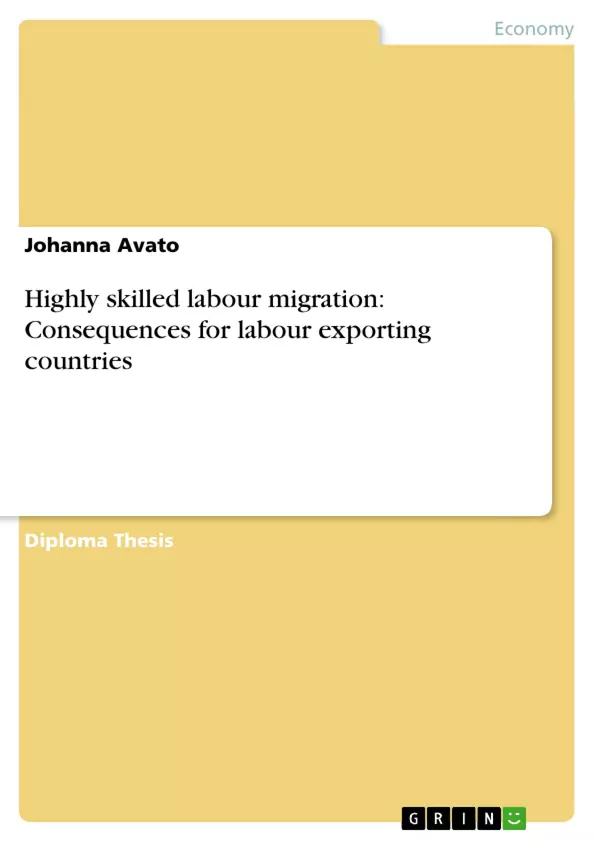
Highly skilled labour migration: Consequences for labour exporting countries
Diplomarbeit, 2004
65 Seiten, Note: 1.3
Leseprobe
Inhaltsverzeichnis (Table of Contents)
- General Theories of International Migration
- Introduction
- Trends in International Migration
- Microeconomic Approaches
- Macroeconomic Approaches
- Theories of International Highly Skilled Labour Migration
- Dynamics of Highly Skilled Labour Migration
- The Case of Highly Skilled Migrants
- Critical Mass Dynamics
- Effects of the Brain Drain – The Traditional View
- Static Effects
- Dynamic Effects
- Effects on Development
- Effects on Growth
- Effects of the Brain Drain - Recent Developments
- The Optimal Brain Drain
- The Feedback Effects
- The Diaspora
- Remittances
- Return
- Technology Transfer
- How Big is the Brain Drain - Empirical Evidence
- Effects of the Brain Drain: The Empirical Analysis
- Critical Mass
- Static Effects
- The Optimal Brain Drain
- The Feedback Effects
- The Diaspora
- Remittances
- Return
- Technology Transfer
- Policy Responses to High Skilled Migration
- Immigration Policies
- Mobilising the Diaspora
- Retention
- Conclusion
Zielsetzung und Themenschwerpunkte (Objectives and Key Themes)
This paper analyzes the consequences of highly skilled labor migration for developing countries, particularly focusing on the phenomenon known as the brain drain. It explores the traditional view of the brain drain as a negative force hindering development and the recent developments that offer a more nuanced perspective. The paper aims to examine the effects of highly skilled migration on both static and dynamic aspects of developing countries, including their development trajectory and economic growth.
- The impact of highly skilled labor migration on developing countries
- The traditional and contemporary views of the "brain drain"
- The role of human capital in economic development
- The effects of brain drain on static and dynamic aspects of development
- Policy responses to highly skilled migration
Zusammenfassung der Kapitel (Chapter Summaries)
The introduction establishes the historical context of international migration and highlights the recent increase in highly skilled migration driven by global economic disparities. The paper then examines the economic theories behind international migration, including microeconomic and macroeconomic approaches. Chapter 3 delves into the dynamics of highly skilled labor migration, exploring the concept of critical mass and the traditional view of the brain drain as a detrimental force for developing countries. It analyzes both the static and dynamic effects of the brain drain, including its impact on development and economic growth. Chapter 4 examines the empirical evidence on the brain drain, focusing on the cumulative percentage loss of highly educated individuals and its impact on sending countries. This chapter also explores the concept of educational selectivity, examining how the brain drain might affect the quality of human capital remaining in developing countries. Chapter 5 delves into recent developments concerning the brain drain, including the "optimal brain drain" and the feedback effects of migration on sending countries. It explores the roles of the diaspora, remittances, return migration, and technology transfer in mitigating the negative impacts of the brain drain. Chapter 6 examines policy responses to highly skilled migration, focusing on immigration policies, strategies for mobilizing the diaspora, and initiatives aimed at retaining highly skilled workers in developing countries. This preview concludes with a summary of the key findings and arguments presented in the first six chapters.
Schlüsselwörter (Keywords)
The primary keywords and focus topics include highly skilled labor migration, brain drain, human capital, economic development, developing countries, remittances, diaspora, return migration, technology transfer, and policy responses.
Frequently Asked Questions
What is "Brain Drain"?
Brain drain refers to the emigration of highly skilled and educated individuals from developing countries to developed nations, leading to a loss of human capital.
Can Brain Drain become "Brain Gain"?
Yes, recent theories suggest that through the diaspora, remittances, return migration, and technology transfer, sending countries can actually benefit from their expatriates.
How does highly skilled migration affect economic growth?
Traditional views argue it hampers growth by depleting essential human capital, while newer models explore the "optimal brain drain" that might encourage education at home.
What are "Remittances"?
Remittances are funds transferred by migrants back to their home countries, often serving as a significant source of income and development capital.
What policy responses can help sending countries?
Strategies include mobilizing the diaspora, improving retention of skilled workers, and fostering technology transfer from abroad.
Details
- Titel
- Highly skilled labour migration: Consequences for labour exporting countries
- Hochschule
- Fachhochschule Bingen (Lehrstuhl für Internationale Wirtschaftspolitik)
- Note
- 1.3
- Autor
- Johanna Avato (Autor:in)
- Erscheinungsjahr
- 2004
- Seiten
- 65
- Katalognummer
- V45163
- ISBN (eBook)
- 9783638426114
- ISBN (Buch)
- 9783638707480
- Dateigröße
- 761 KB
- Sprache
- Englisch
- Anmerkungen
- Labour Economics, Brain Drain, Theories of Migration, Economic Development, Diaspora, Remittances
- Schlagworte
- Highly Consequences
- Produktsicherheit
- GRIN Publishing GmbH
- Preis (Ebook)
- US$ 31,99
- Preis (Book)
- US$ 45,99
- Arbeit zitieren
- Johanna Avato (Autor:in), 2004, Highly skilled labour migration: Consequences for labour exporting countries, München, Page::Imprint:: GRINVerlagOHG, https://www.diplomarbeiten24.de/document/45163
- Autor werden
- Ihre Optionen
- Vertriebskanäle
- Premium Services
- Autorenprofil
- Textarten und Formate
- Services für Verlage, Hochschulen, Unternehmen

- © GRIN Publishing GmbH.
- Alle Inhalte urheberrechtlich geschützt. Kopieren und verbreiten untersagt.
- info@grin.com
- AGB
- Open Publishing
Der GRIN Verlag hat sich seit 1998 auf die Veröffentlichung akademischer eBooks und Bücher spezialisiert. Der GRIN Verlag steht damit als erstes Unternehmen für User Generated Quality Content. Die Verlagsseiten GRIN.com, Hausarbeiten.de und Diplomarbeiten24 bieten für Hochschullehrer, Absolventen und Studenten die ideale Plattform, wissenschaftliche Texte wie Hausarbeiten, Referate, Bachelorarbeiten, Masterarbeiten, Diplomarbeiten, Dissertationen und wissenschaftliche Aufsätze einem breiten Publikum zu präsentieren.
Kostenfreie Veröffentlichung: Hausarbeit, Bachelorarbeit, Diplomarbeit, Dissertation, Masterarbeit, Interpretation oder Referat jetzt veröffentlichen!
- GRIN Verlag GmbH
-
- Nymphenburger Str. 86
- 80636
- Munich, Deutschland
- +49 89-550559-0
- +49 89-550559-10
- info@grin.com
-









